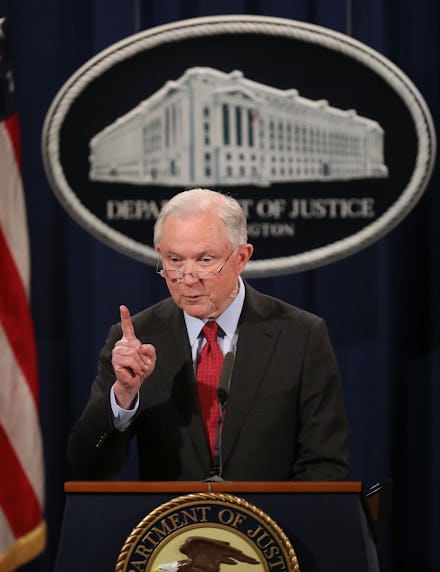Sessions to allow prosecutors to enforce federal marijuana laws, even in states where pot is legal

Attorney General Jeff Sessions is rescinding guidelines dating to the Obama administration that allow marijuana growers and sellers to operate in states that have legalized the drug, potentially opening up those marijuana businesses to criminal prosecution, the Associated Press reported Thursday.
The federal government currently classifies marijuana as a Schedule 1 drug, the highest drug classification. This ranks pot in the same class as heroin and ecstasy. The Obama administration didn’t change that classification, but decided to allow marijuana growers and sellers to operate in the states that have legalized pot in some form, currently totaling 29.
Now, Sessions will allow federal prosecutors to decide whether or not they want to enforce the federal marijuana laws.
The decision comes days after California officially allowed the legal sale of recreational marijuana, a new revenue stream that could add billions to the state economy.
Sessions has long been a vocal opponent of relaxing marijuana laws. During an April 2016 Senate hearing on recreational marijuana, Sessions said, “We need grown-ups in charge in Washington to say marijuana is not the kind of thing that ought to be legalized, it ought not to be minimized, that it’s in fact a very real danger.”
Since becoming attorney general, he has suggested this move could be imminent.
In October, during an interview with conservative radio host Hugh Hewitt, Sessions said he didn’t believe states had the right to supersede federal law to legalize marijuana, and hinted at forthcoming enforcement of federal law against marijuana growers and sellers.
“I do not believe there’s any argument that because a state legalizes marijuana, that the federal law against marijuana is no longer in existence,” Sessions told Hewitt. “I do believe that the federal laws clearly are in effect in all 50 states and we will do our best to enforce the laws as we’re required to do so.”
Sessions’ decision could cost states such as California, Colorado and Washington billions in revenues.
One report, released Tuesday, projected legal marijuana will add $40 billion to the economy by 2021, and add 414,000 jobs.